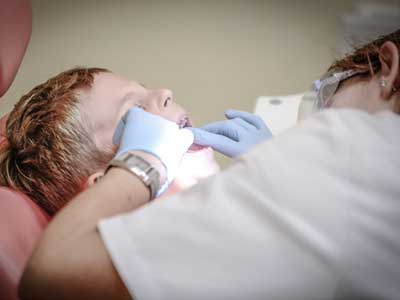
18 Feb Dental Care for Children with Special Needs: Tips and Resources
Caring for a child’s dental health is essential for their overall well-being. However, when it comes to children with special needs, providing proper dental care can be more challenging. Children with special needs may have unique requirements and sensitivities that demand a tailored approach to oral health.
In this blog, we’ll discuss important tips and resources for parents and caregivers to ensure the dental health of children with special needs.
Children with special needs encompass a wide range of conditions, including autism, Down syndrome, cerebral palsy, and more. These children often face various challenges that can make dental care difficult. Sensory sensitivities, communication barriers, and mobility issues are some of the obstacles that parents and caregivers may encounter.
Special Needs Tips for Dental Care
- Start Early: Begin oral care routines as soon as possible. The earlier a child becomes accustomed to dental care, the more comfortable they will be with the process.
- Choose the Right Dentist: Finding a pediatric dentist experienced in treating children with special needs is crucial. These professionals understand the specific challenges and can provide a more supportive environment.
- Create a Routine: Consistency is key. Establish a regular dental routine that includes brushing, flossing, and dental check-ups. Use visual schedules or timers to help children anticipate and understand the process.
- Sensory-Friendly Tools: Some children with special needs may have sensory sensitivities. Use soft-bristle toothbrushes, kid-friendly toothpaste flavors, and specialized toothbrushes that vibrate or light up to make dental care more appealing.
- Teach and Model: Show your child how to brush and floss by using a “watch and learn” approach. Sometimes, children with special needs respond better to visual demonstrations.
- Positive Reinforcement: Praise and rewards can be effective motivators. Offer verbal encouragement and small rewards to reinforce good oral care habits.
- Communication: Work with your child’s dentist to develop a communication plan. This may involve using alternative methods such as sign language or visual aids to help your child understand and cooperate during dental visits.
- Plan for Accommodations: Discuss any special accommodations your child may need with the dental office ahead of time. This could include a quiet waiting area, shorter appointments, or sensory support.
Resources for Parents and Caregivers
- Specialized Dental Clinics
Many states have specialized dental clinics for children with special needs. These facilities are equipped to handle a variety of challenges and provide a more supportive environment. - Local Support Groups
Connect with local support groups or organizations focused on children with special needs. They can provide valuable information and recommendations for dentists experienced in this field. - Government Programs
In some countries, government programs or insurance plans may offer additional support for children with special needs, including dental care. Check with your local health authorities for available resources. - Online Resources
Numerous websites and forums are dedicated to helping parents of children with special needs. These platforms often offer tips, advice, and firsthand experiences that can be incredibly valuable.
Final Thoughts
Dental care for children with special needs requires patience, understanding, and a tailored approach. By implementing the tips mentioned above and utilizing available resources, parents and caregivers can help ensure that these children enjoy good oral health and a positive dental care experience. If you still have questions on dental care for children with special needs please contact Dr. Alina at Kids Pediatric Dentistry in Allen, Texas. Our specialists will be happy to help you with any dental related questions.
Further Reading – Special Needs Dental Care
Dental Care Tips for Children with Special Needs
Kids Dental Care – Specialplace.com
Special Needs in Dentistry – Colgate
